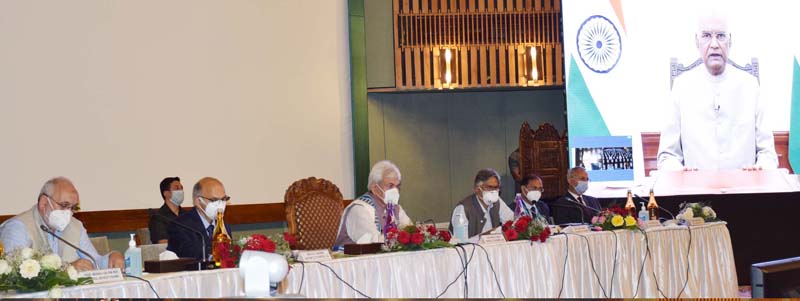It’s historic & holistic document, says LG
Excelsior Correspondent
Jammu/Srinagar, Sept 20: Determined efforts should be made to make Jammu and Kashmir a hub of knowledge, innovation and learning by implementing the new National Education Policy (NEP) in letter and spirit, President Ram Nath Kovind said toady.
He said Jammu and Kashmir is a reservoir of extremely intelligent, talented and innovative children and the implementation of the new education policy will produce students with ignited minds.
Click here to watch video
“Determined efforts should be made to make the paradise a hub of knowledge, innovation and learning by implementing NEP in letter and spirit. These steps would make Jammu and Kashmir once again a ‘Firdaus on the earth, a bright jewel on the crown of Mother India’ as it was referred to in the medieval age,” Kovind said.
The President made the comments during a conference on the implementation of the NEP in Jammu and Kashmir.
“India has an unprecedented demographic dividend but it could be positively realised only if the young people constituting a substantial segment of the population become skilled, professionally competent, and above all educated in the real sense,” he said. Citing the examples of Kalhana’s Rajtarangini and the Mahayana Buddhism, the tenets of which were popular in Kashmir, the President opined that history of India’s cultural traditions would remain incomplete without taking them into consideration.
“It is important to understand our tradition and rich cultural heritage which can be achieved only in our mother tongue. It is this mother tongue that is being encouraged in the new education policy as it adheres to the cultural ethos of our country,” he said.
The NEP approved by the Union Cabinet in July replaces the National Policy on Education framed in 1986 and is aimed at paving the way for “transformational reforms” in schools and higher education systems to make India a “global knowledge superpower”.
“The three-language formula which is envisioned in this policy is of immense significance and could promote multilingualism as well as national unity but at the same time no language will be imposed on any state or union territory,” the President said.
Meanwhile, National Education Policy 2020 is not only a historic and holistic document but for the first time, has been created as a reflection of aspirations of the parents, teachers, students, and education experts, which aims to address the challenges for the coming generations,” Lieutenant Governor Manoj Sinha remarked while inaugurating the “Brainstorming on Implementation of the National Education policy-2020 in Jammu And Kashmir at Sher-i-Kashmir International Conference Centre (SKICC) Auditorium, in Srinagar today.
Advisors to Lt Governor KK Sharma, Baseer Ahmad Khan; Vice-Chancellor, Univesity of Kashmir, Prof Talat Ahmad; Vice-Chancellor of Islamic University of Science and Technology (IUST) Awantipora, Prof Mushtaq Sidiqui; Former Chairman, UGC, Prof. Ved Prakash; Director NIT Prof. Rakesh Sehgal; Principal Secretary School Education Department, Dr. Asgar Hasan Samoon; Former VCs, DC Srinagar Shahid Iqbal Choudhary; Principals of GDCs and others were present on the occasion.
Quoting Nelson Mandella, the Lt Governor said “Education is the most powerful weapon, which you can use to change the world.” “Education can breed prosperity, peace and harmony in the society if we use this tool effectively and efficiently”, he added.
On the inaugural day of the brainstorming session, Advisor to Lt Governor KK Sharma gave a brief presentation on the roadmap for the of implementation of NEP-2020 in J&K. Terming the step as a milestone in over 30 years; he exclaimed that it would focus on developing better human beings apart from a generation of jobs and careers. It enumerates Revamping of curriculum, Aesthetic development, and teacher education.
Sinha further remarked that the New Education Policy contains features of Equity, Quality, Affordability and Accountability. It promotes Individual Development through experience-based Education and logical thinking.
While addressing the gathering of VCs, former VCs, Principals of different Degree Colleges from across the UT, the Lt Governor impressed upon them to use the progressive features of the NEP-2020 for the benefits of students. He called for mission mode efforts to meet the growing knowledge economy through best practices available worldwide including e-content and interactive modules.
Sinha said, “The role and responsibility of teachers and educationists have now become bigger and so is the expectation from parents, students, and a vast global market that is looking for young Indian talents. One of the objectives of this interactive session on NEP-2020 is to discuss the doubts and apprehensions regarding the provisions of this policy and to ensure that each and every important aspect of this education policy is implemented in a time-bound manner.”
The Lt Governor also said that while nurturing the talents for a self-reliant India, our collective focus should be professional and qualitative research with synthesis of three elements- teacher, students, and curriculum, so when they are out of college after completing the education, a job or self-employment opportunity is available for them.
“As President and Prime Minister have called for enhanced exposure to vocational training at a young age for Atma-Nirbhar Bharat, the Vocational curriculum will help us to meet the challenges of college to work transition. Moreover, it will bridge the gap in vocational training requirements and current availability of skilled manpower”, the Lt Governor said.
Underlining the salient features of NEP-2020 the Lt Governor said that this education policy envisaged a National Research Foundation for quality research. He appealed to the educationists to inspire and strengthen the culture of research in universities and transform this into a sort of movement. He termed the policy as dream of teachers and students and assured that the government would play the role of enabler at every step of this journey.


